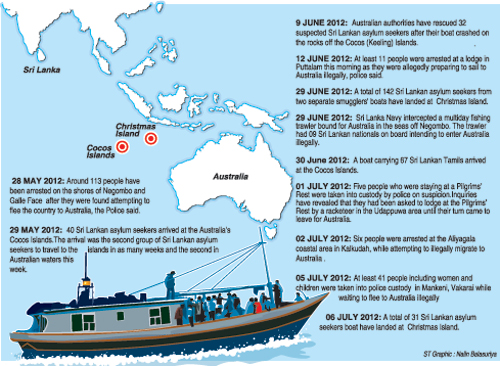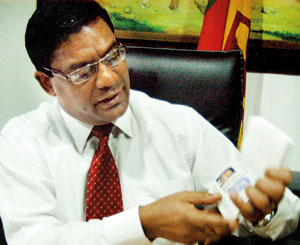Editorial
Illegal migration: Two sides
View(s):People smuggling and asylum seekers have been competing for space in the media for some time now, and succeeding in grabbing the headlines. The focus at the moment is on the boatloads of Sri Lankans, as the headline in our report on the subject last week had it “risking blue waters in search of greener pastures”.
Sri Lanka was once a nation that people in neighbouring countries wanted to covertly slip into. So much so, a tri-services unit called TAFII (Task Force Against Illicit Immigration) was set up to prevent aliens from entering the country, especially from South India. Over the years, the roles have been reversed and the Forces have been deployed to ensure Sri Lankans don’t slip out of the country unlawfully to other lands.
For quite some time, emigration from Sri Lanka has taken place. First, it was the introduction of Sinhala as the Official Language that led to the exodus of the Anglo-Asians, especially to Australia which at the time was looking for English-educated persons to man its growing administration. Various other factors ranging from foreign exchange controls, ceiling on incomes, better education for the children, extra incomes for new families, and also, the seduction by foreign countries offering employment to professionals, commonly referred to as the ‘brain drain’ were the combined causes for almost one in ten Sri Lankans being overseas.
Even now, many of the economically developed world openly tap into the brains of the developing world. In August last year, the British Government announced the ‘Exceptional Talent Migration’ route which encourages talented leaders in the fields of science, humanities, engineering and the arts to work in Britain.
These countries that nitpick at the economically developing world for not adhering to norms of good governance and are quick to quote from the UN ICCPR (International Covenant on Civil and Political Rights) relating to human rights issues think nothing of luring intellectuals from these countries to prop up theirs. Provisions relating to ‘Freedom of Movement’ contained in the ICCPR are equally ignored.
Clause 12.2 of the ICCPR says, “Everyone shall be free to leave any country, including his own”. No doubt there are restrictions. It is not an absolute unfettered right, but the broad principle is recognised. These countries invoke their right to protect their sovereign borders overriding the general ICCPR principle which they otherwise advocate.
Immigration, illegal or legal, is no doubt a controversial subject in these economically developed nations more so during periods of economic downturn and high unemployment. They become emotive socio-economic-political issues. In France recently, the then President threw his weight behind the anti-immigration lobby only to his peril as more French voters still remain firm in their liberal views.
The stringent visa procedures adopted by local missions, including the finger printing of applicants, clearly depicts the unfortunate disparity of the world economic order. Tourists from these countries are welcomed with garlands on arrival in the so-called Third World. It is this disparity that is at the root of all this migration.
Australia, the land of immigrants is now facing the brunt of illegal immigration and Sri Lankans, among others, landing on their soil is a major headache to them; so much so that Australia’s envoy in Colombo was dispatched to seek an appointment with the Navy Commander asking for assistance to apprehend these boats leaving Sri Lankan territorial waters.
Moot questions have been asked as to why the Australian Government is coy about sending these boatloads of people back to their home country. Officially, they quote a ‘protection policy’ that affords such illegal immigrants some cover from deportation. Not long ago, there was similar traffic to Italy. Local administrators in that country, however, turned a Nelsonian eye to these boats arriving despite public posturing to the contrary. The fact was that they did not mind a certain number of illegal immigrants coming into their country so that the menial jobs could be done by them. Someone has to keep their sewers clean, collect their garbage and wait on them at the restaurants.
Success stories from such adventurous voyages began to circulate in villages. New mansions and villas came up especially in the Chilaw belt and soon relatives were able to find their way to Italy sponsored by those very illegal immigrants who were gainfully employed. There is, therefore, some element of duplicity in this cry to stop illegal immigration.
That said, it is no doubt a slur on Sri Lanka when its people want to ‘run away’ in this fashion. It doesn’t help that the story is flashed in international media networks. It shows that all’s not well at home even though the ‘war’ is over. Clearly, there is a perception that some people are still not secure with the peace, and for others, the post-war economic development has not matched youth unemployment. The search for a job abroad is a top priority for the younger generation.
Last month alone, the Navy detected 400 persons at sea and the Police arrested 150 on land trying to get away to Australia illegally. The Australian High Commission gives the figure of 1346 Sri Lankans having landed on her soil illegally in the first six months of this year.
Such statistics are ‘bad publicity’ for a country trying to bounce back after three decades of conflict and showcase itself to the world through Bollywood shows and Commonwealth Summits etc. It gives the world the impression that there continues to be instability here. We get lumped with those countries plagued with internal turmoil whose citizens want to flee. What’s more, these disgruntled persons could well be the next generation Sri Lankan Diaspora that works abroad to undermine the country.
Whatever said and done, or not done, as the case may be, by governments, there will continue to be this pull, especially for the youth and their parents to go forth in search of that ‘pot of gold’. This gets compounded when there are unscrupulous job agents willing to do the dirty work and also, foreign governments actually not minding a certain amount of illegal immigration.
The answers are not simple, rather a murky cocktail of reasons and a blame game will not help. After all, economic migration is as old as the hills, and the seven seas.
comments powered by Disqus























